How To Successfully Integrate Human Factors Engineering


Human Factors Engineering (HFE) is a discipline of applying human limitations to the design of processes, systems and work environments. An essential part of HFE is the Human Factors Integration Plan (HFIP), which is the “systematic process for identifying, tracking and resolving human related issues to ensure a balance development of both technologies and human aspects of systems”.
The HFIP is important for the human factors engineer to plan its resources and allow successful integration of HFE. As HFE compromises of many elements, such as safety aspects, efficiency aspects, human aspects, technology needs and more, a HFIP needs to be a comprehensive plan that includes several topics. The HFIP includes the project scope, depth of analysis required and the list of HFI issues identified prior. The HFIP varies project to project, and the HFE team has to identify all the Human Factors activities needed to mitigate all issues and risks relating to the project while taking into account any relevant rules and regulations.
The HFIP should be customised to each project. For example, small, short-term projects may require a brief plan whereas a large scale long-term projects require a more detailed one. Below is an overview of what a HFIP should contain:
- Introduction
- Project overview
- Scope and purpose
- Key objectives
- Key identified HF requirements
- HFI Strategy
- Learning from Experience
- Summary of intended HF Methods, Tools & Techniques to be used to identify and manage risks, engage stakeholders, target audience
- Verification, Validation and Acceptance Methods
- Relationship with other documentation
- Key Deliverables
- Acceptance Criteria
- HFI Work Programme
- Outline Programme of work
- Key activity milestones
- Key review dates
- Organisation and Management
- Your Organisation
- External Stakeholders
- External Customer
- Opportunities
- Identified Risks and Potential Mitigations
- Early Human Factors Analysis
- Introduction, Design Assumptions, Process and Results
- Conclusion
- References, Abbreviations and Acronyms
Human Factors Engineering for Oil and Gas is a 2-day course held from 15 – 16 October 2018 (Singapore) and 17-18 October 2018 (Kuala Lumpur), where delegates will learn about understanding human limitations, learning about human factors contributions to accidents, gaining knowledge on Human Factor Integration and regulatory requirements and more. Case studies will also be used to show practical examples of Human Factors and what are the key learning points we can learn from them. For more information, please visit us at http://www.opuskinetic.com/training or contact us at info@opuskinetic.com.
Opus Kinetic believes that people are why organisations are successful, and giving people the knowledge to perform well at their job is integral for success. We pride ourselves as the premier provider of knowledge, offering acclaimed in-house trainings, and many others professional training courses spanning from various industries. Our training courses are well researched and updated with the latest industry trends. For more information on our professional training programs, visit us at http://www.opuskinetic.com/training.
